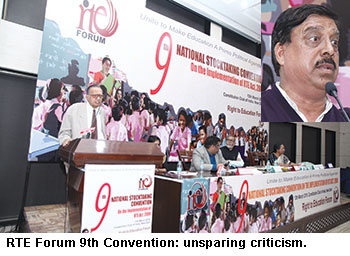 A report card which compares the education delivery record of the BJP-led National Democratic Alliance (NDA) government at the Centre with promises made in its Election Manifesto 2014, shows the coalition in poor light.
A report card which compares the education delivery record of the BJP-led National Democratic Alliance (NDA) government at the Centre with promises made in its Election Manifesto 2014, shows the coalition in poor light.
The RTE Forum, a coalition of civil society groups which monitors implementation of the Right of Children to Free & Compulsory Education (RTE) Act, 2009, says there has been a mere 4 percent increase in the number of schools compliant with at least ten mandates of the Act. Of the 1.53 million primary/elementary schools countrywide, only 12.7 percent are compliant with ten mandates against 9 percent in 2014 when the BJP was swept to power in Delhi, translating into a mere 1 percent increase per year.
The report card released during the RTE Forum’s 9th annual National Stock-Taking Convention in Delhi on March 13, has also evaluated performance against the manifesto promise of universalisation of secondary school education and serious pursuit of skill development. According to the forum’s report, secondary schools numbered 236,000 in 2013-14. In 2016-17, they numbered 260,000. Enrolment in secondary and higher secondary schools in the three-year period inched up from 74.89 to 79.35 percent, and from 49.88 to 51.37 percent respectively.
While the RTE Forum’s ninth report is still being finalised, the preliminary draft indicates that it will be unsparing in its criticism of the BJP/NDA government’s broken promises on education. According to the report, against Union HRD minister Prakash Javadekar’s promise that NCERT (National Council for Educational Research & Training) would reduce the syllabus of the Central Board of Secondary Education (CBSE) by 50 percent to alleviate the examination stress of children, NCERT has pruned only 10-15 percent, and mainly in social science subjects.
Moreover, it contradicts the government claim of total electrification of schools. The forum’s draft report reveals that only 64 percent of government schools are electrified and a mere 15 percent have functional computers.
The BJP’s amendment of the RTE Act to remove the no-detention until completion of elementary education (s.16) provision is roundly condemned by the draft report, which cites a Supreme Court observation to the effect that it “has the potential to damage the internal coherence of the RTE Act”, and says that the “national and state governments must not punish children for the system’s fault”.
The forum has also taken on NITI Aayog, the Central government’s think tank, for recommending that the input norms specified by s.19 should be transformed into “guidelines and the focus should shift to outcomes instead”. This recommendation is “dangerous and can be seen as being part of an ongoing process of dismantling the RTE Act, removing the most critical enforceable provisions,” says the forum.
It’s also pertinent to recall that in its Election Manifesto 2014, the BJP had promised to take the lead in enhancing annual national (Centre plus state) expenditure on public education to 6 percent of GDP and also to establish a national Education Commission and present a new National Education Policy. Neither of these promises have been fulfilled. National spending on education has averaged 3.5 percent of GDP through the BJP/NDA government’s five-year tenure. Moreover although two high-powered committees were constituted to draft a New Education Policy, it has not been presented to the nation. The perfectly rational and constructive report of the T.S.R. Subramaniam Committee completed in record time in 2016, was rejected for mysterious reasons. A second draft reportedly completed by a committee chaired by eminent space scientist K. Kasturirangan, is in cold storage. Against this sobering backdrop, the RTE Forum’s report urges the public to “unite to make education a prime political agenda” (sic).
On the eve of the tenth anniversary (April 1) of the RTE Act, its lackadaisical implementation by the Congress-led UPA-II and BJP/NDA government has greatly disappointed education reform activists gathered under the RTE Forum umbrella. Despite the RTE Act being strongly criticised for its anti-private schools bias and for shifting part of the State’s constitutional obligation to universalise free and compulsory primary/elementary education to private schools, the RTE Forum commends the Act for having introduced “progressive concepts such as neighbourhood schooling, age-appropriate learning, continuous and comprehensive evaluation, ban on corporal punishment, among others”.
“We are determined to demand answers from the entire political class over its failure to implement the RTE Act in letter and spirit. Over the past five years, the percentage of schools compliant with at least ten RTE mandates has increased by 4 percent, inching up at an average of 1 percent per year. At the current rate of progress, it will take India 87 years to make every school compliant with the minimalistic quality norms prescribed by the RTE Act. Clearly this is unacceptable,” says Ambarish Rai, national convener of the RTE Forum.
A scathing, but justified indictment.
Autar Nehru (Delhi)























